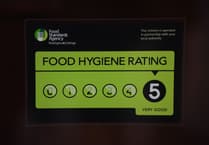ORGANISERS of a meeting to gauge community support for resettling refugees in West Devon were pleased with the ‘positive’ feedback received and resulted in volunteers coming forward to create a steering group and other offers of help.
Over 200 people filled Tavistock College hall on Friday to hear from a panel of guest speakers, including MP for West Devon and Torridge Geoffrey Cox, Stephen Hastings, a volunteer who has travelled to Calais and Paris to provide humanitarian aid, West Devon and South Hams housing officer Isabel Blake, Devon County Council officer responsible for the county response to refugees Simon Milner and Michael Grace from Refugee Support Devon.
The meeting was organised by a group of concerned residents who had discussed the plight of refugees fleeing to Europe and want to be supportive of refugees being accepted into the UK.
They said West Devon Borough Council was a sponsoring local authority but community support was necessary, both to welcome and ensure a successful integration of refugee families.
One of the members Jane Musgrave said: ‘We want to welcome and help refugee families and unaccompanied children so we are holding this public meeting to share what we have learned and to form an organisation to support them if and when they come to our area.’
Mr Cox told the meeting that Central Government had agreed to take in 20,000 refugees and what the group was looking for was ‘essential community support’ and those willing to be involved when West Devon started to take refugees. West Devon had pledged to take four refugees families.
He said that money had been set aside for the service but community support and engagement could provide the support that anyone relocating from a traumatic area would require.
The majority of refugees were ‘well educated, affluent, well- to-do people’, who had not come so much from poverty and were looking to make a valuable contribution to the community, he said.
Stephen Hastings gave a first hand account of what life was like in the Calais camps and what it had been like since the camps were closed, meaning many hundreds of migrants were sleeping rough in the streets.
He highlighted in particular the plight of unaccompanied refugee children whose families had either already made it to the UK and had been split up by traffickers or had been killed.
He said the camps were dirty and disorganised, lacking washing and toilet facilities and limited clean water supplies and there was no safeguarding, with young unaccompanied minors sharing tents with several adults meaning sexual assault and rape was commonplace.
He said: ‘Police treatment of the minors included beatings and confiscating their mobile phones, which for many was their only form of contact with their families in other areas. They would confiscate their blankets and bags and if they were caught trying to get on a lorry, they would take their shoes, blankets and coats and make them walk back to the camps. Many of the unaccompanied children have the right to come to Britain but the speed the Home Office was processing them was about one a week so it was taking a long time.’
He also said since the camps closed many migrants were sleeping rough and had lack of support from the French public. Volunteers going out to help were being criminalised, arrested and beaten for trying to help.
Housing officer Isabel Blake highlighted that West Devon was the first area in Devon to pledge to bring Syrian people to the area, but said there was a shortage of housing which was why none had been resettled in the area yet. She, and Devon County Council’s Simon Milner appealed for private landlords with properties to come forward.
Simon said: ‘The only thing that is stopping refugees from coming to West Devon is the lack of private landlords. Seven Syrian families have been resettled across the county so far and there will be more in the next couple of months. Devon has pledged to take 32 families in total.
In the South West there is a struggle to get a housing supply but it is coming, just not quick enough. If you know anyone who rents out a property, please get them to get in touch with us. Funding flows from the day the family arrives for five years. If someone comes forward with a property, we could have a family on the plane tomorrow.’
Following the meeting, one of the organisers Angus Doulton said: ‘The meeting was extremely positive. Among other things it was clear that landlords were not aware of the quite considerable benefits in renting to refugees under the Government scheme.
‘It resulted in around 20 volunteers coming forward to help take everything further on a steering group and many other offers of help. Notes of the meeting will be going out to all who left contact details this week.
‘Anyone else who would like a copy of these notes is welcome to contact me at [email protected] ’





This article has no comments yet. Be the first to leave a comment.